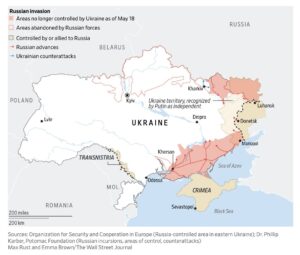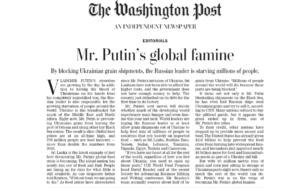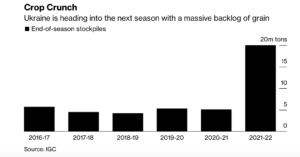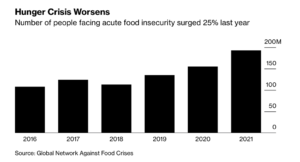China has bought at least 8 million tons of US soybeans this year, according to people familiar with the matter, putting the world’s top importer on track to meet a…
May Grain Exports From Ukraine Could Reach 1.5 Million Tonnes
Reuters writer Pavel Polityuk reported on today that, “Ukraine’s grain exports could reach 1.5 million tonnes in May compared with around 1 million tonnes in April, Roman Slaston, Director General of the Ukrainian Agrarian Business Club Association, said on Monday.
“He told a briefing that the near-term aim was to increase the volume to 3 million tonnes per month. He put the rise in exports down to the establishment of alternative routes to export grain after Russia blocked Ukraine’s main sea ports.”
More broadly, Patrick J. McDonnell and Nabih Bulos reported on the front page of Sunday’s Los Angeles Times that, “Russian troops pressed their offensive into the Donbas region on Saturday, aiming to encircle the easternmost point of Ukrainian control in what one official said would be a repeat of Moscow’s assault on the beleaguered city of Mariupol.”

The LA Times article noted that, “Ukrainian President Volodymyr Zelensky, in remarks released Saturday, again insisted his country will ultimately prevail in the grueling conflict but that it will be a ‘bloody’ victory.
“‘I do not believe that we were badly prepared for the war,’ he said. ‘We should look at the price of this war. We are going to reclaim everything in any case. We have broken the backbone of one of the strongest armies in the world.’
“But, he acknowledged: ‘The war is so complicated and so will be the victory. It will be bloody, through fighting, but the end will definitely be via diplomacy.’
“At the same time, he said prospects for talks with Russia right now were dim.”
And The Washington Post editorial board indicated in today’s paper that, “Vladimir Putin’s atrocities are growing by the day. In addition to having the blood of Ukrainians on his hands from his completely unjustified war, the Russian leader is also responsible for the growing starvation of people around the world. Ukraine is the breadbasket for much of the Middle East and North Africa. Right now, Mr. Putin is preventing Ukrainian grain from leaving the port of Odessa and along other key Black Sea routes. The result is dire: Global food prices are at an all-time high, and 276 million people are food insecure — more than double the numbers from 2019.”

The Post noted that, “Mr. Putin’s next moves will decide whether much of the developing world experiences mass hunger and even famine this year and next. World leaders are urging the Russian leader to at least allow grain shipments out of Ukraine to help feed tens of millions of people in countries that rely heavily on imported food — such as Sri Lanka, Burkina Faso, Yemen, Sudan, Lebanon, Tanzania, Uganda, Egypt, Tunisia and Cameroon.”
“But with 20 million metric tons of grain and corn just sitting in storage at Ukrainian ports right now, there’s only so much the rest of the world can do. Mr. Putin’s war is on the verge of becoming Mr. Putin’s global famine,” the Post said.

Late last week, Bloomberg’s Mike Dorning reported that, “A dearth of funding coupled with a surge in inflation is forcing hunger-relief programs across the globe to cut back on services just as the world’s poorest need it most, creating a situation that will erode human welfare and possibly plant the seeds of political instability.
“Stresses on international food aid are happening both at the government level and for organizations including the World Food Programme, the group that just two year ago won the 2020 Nobel Peace Prize for its hunger-fighting efforts. Russia’s invasion of Ukraine has further strained the global food market, which was already reeling from the pandemic and climate change. Wheat futures, for example, have surged more than 50% this year, making the grain less affordable for use in staples like bread.”

“The World Food Programme forecasts that in the 81 countries where it works another 47 million people will suffer acute hunger by the end of the year — a 17% increase — if the war in Ukraine continues,” the Bloomberg article said.
Meanwhile, Reuters writers Martin Quin Pollard and Eve Wu reported yesterday that, “China’s central government has made available 10 billion yuan ($1.49 billion) for ‘one-off’ subsidies to support individuals and companies involved in grain cultivation and production, according to a statement published on Sunday by the country’s Ministry of Finance.
“The subsidies aim to support grain growers during the summer and autumn harvest and sowing period, to alleviate any impact of rising costs and to ‘further mobilise farmers’ enthusiasm’ for cultivating grain, the statement said.
“The announcement comes at a time when China’s farmers are grappling with high fertiliser prices, which have soared globally since last year.”





